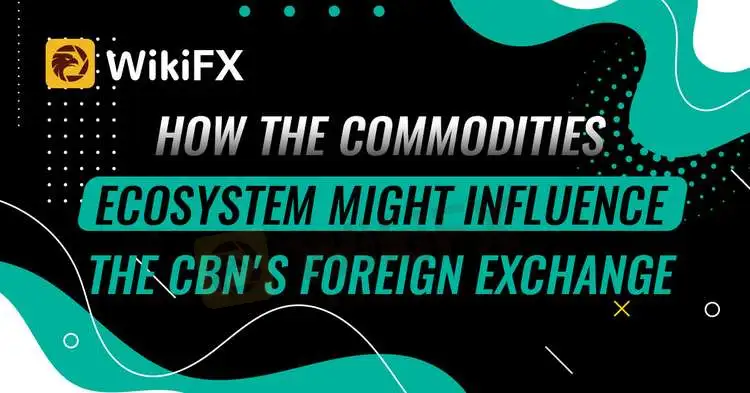简体中文
繁體中文
English
Pусский
日本語
ภาษาไทย
Tiếng Việt
Bahasa Indonesia
Español
हिन्दी
Filippiiniläinen
Français
Deutsch
Português
Türkçe
한국어
العربية
HOW THE COMMODITIES ECOSYSTEM MIGHT INFLUENCE THE CBN'S FOREIGN EXCHANGE POLICY
Abstract:Bankers and other financial market participants in Nigeria have highlighted commodity ecosystem deployment as a mechanism for the Central Bank of Nigeria (CBN) to meet its objective to earn up to $200 billion yearly from non-oil exports over the next three to five years under its RT 200 FX policy.

Bankers and other financial market participants in Nigeria have highlighted commodity ecosystem deployment as a mechanism for the Central Bank of Nigeria (CBN) to meet its objective to earn up to $200 billion yearly from non-oil exports over the next three to five years under its RT 200 FX policy.
The stakeholders who assembled at a breakfast meeting organized by the Lagos Commodities and Futures Exchange (LCFE) over the weekend agreed that the proper use of Nigeria's commodities ecosystem provides the abundant potential for the apex bank to produce currency from non-oil exports.
Olugbenga Awe, Divisional Head, Agribusiness, Natural Resources, and Project Development at Heritage Bank, highlighted in his presentation that the Nigerian economy had been well-diversified, except for the sources of forex.
According to Awe, who spoke at the 'The Opportunities for Financial Institutions in the CBN RT 200 FX' event, a commodities exchange is a risk management tool.
According to him, the capacity to match global standards and demand is the most difficult hurdle facing Nigerian non-oil product exports. He noted that if Nigerian non-oil products satisfy global standards, they might improve foreign profits.
“This is where commodity exchanges come into play.” Any product with an electronic receipt that is exchanged on a commodities market must be of global quality.
“Banks are prepared to assist exporters if they satisfy specific requirements, such as a track record of success, export volume and frequency, payment methods, product sourcing strategy, risk mitigation, and seasonality, among others.”

Bode Abikoye, Managing Director of Agvest Nigeria, agreed, noting that commodity prices provide insulation from the consequences of inflation.
“Many experts advocate investing a portion of your portfolio in commodities as a diversifier asset class.”
Furthermore, some commodities, such as precious metals and energy items, tend to be ideal inflation hedges.
Investors divide commodities into two types: hard and soft. Metals such as gold, copper, and aluminum, as well as energy goods such as crude oil, natural gas, and unleaded gasoline, need mining or drilling.
“Soft commodities” are agricultural products such as maize, wheat, soybeans, and livestock. Commodities have a low to negative correlation with traditional asset classes such as equities and bonds.
“The major reason commodities prices fluctuate is due to supply-and-demand dynamics.” When a crop has a large harvest, its price normally falls, but drought circumstances might cause prices to climb due to worries that future supplies would be fewer than predicted, Abikoye explained.
Hajara Adeola, Chief Executive Officer of Lotus Capital, explained in her presentation on 'The Potentials of Non-Interest Financial Instruments to Finance Commodities Ecosystem' that non-interest financial instruments were based on managing businesses on moral principles, and that they offer many benefits to investors.
Akin Akeredolu-Ale, Managing Director of LCFE, explained in his welcome remarks that a commodities exchange would always come in by catalyzing an enabling environment, alignment of relevant stakeholders, a transparent trading platform, certification and standardization, data and price discovery, an enabling environment for price discovery, and a regulatory framework.

Disclaimer:
The views in this article only represent the author's personal views, and do not constitute investment advice on this platform. This platform does not guarantee the accuracy, completeness and timeliness of the information in the article, and will not be liable for any loss caused by the use of or reliance on the information in the article.
Related broker
Read more

The Daily Habits of a Profitable Trader
Every professional trader follows a structured approach to ensure they are well-prepared, disciplined, and able to seize opportunities with confidence. Whether you are a seasoned investor or an aspiring trader, adhering to a robust daily checklist can significantly enhance your performance. Use this checklist to check if you are a qualified trader

The Impact of Interest Rate Decisions on the Forex Market
Interest rate changes determine currency attractiveness, influencing capital flows and exchange rate trends. Understanding this mechanism helps investors navigate the forex market effectively.

How a Housewife Lost RM288,235 in a Facebook Investment Scam
A 47-year-old housewife in Malaysia recently fell victim to an online investment scam, losing a substantial sum of RM288,235 after engaging with a fraudulent scheme advertised on Facebook.

A Trader’s Worst Mistake: Overlooking Broker Reviews Could Cost You Everything
In today’s digital age, reviews influence nearly every decision we make. When purchasing a smartphone, television, or home appliance, we pore over customer feedback and expert opinions to ensure we’re making the right choice. So why is it that, when it comes to choosing an online broker where real money and financial security are at stake many traders neglect the crucial step of reading reviews?
WikiFX Broker
Latest News
The Withdrawal Trap: How Scam Brokers Lure Victims into Paying More
FCA to Investors: Think Twice Before Trusting These Brokers
Trump\s tariffs: How could they affect the UK and your money
Trump gambles it all on global tariffs he\s wanted for decades
TradingView Brings Live Market Charts to Telegram Users with New Mini App
Trump tariffs: How will India navigate a world on the brink of a trade war?
Interactive Brokers Launches Forecast Contracts in Canada for Market Predictions
Authorities Alert: MAS Impersonation Scam Hits Singapore
Stocks fall again as Trump tariff jitters continue
IG Group Acquires Freetrade for £160M to Expand UK Investment Market
Currency Calculator







